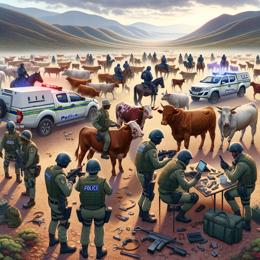Content created by AI
Tobacco Tycoon's Tax Tussle: South Africa's Battle Against Illicit Cigarette Trade
In a landmark development that could hallmark a significant turn in South Africa's fight against illicit trade, tobacco tycoon Adriano Mazzotti's company Carnilinx was cast under the spotlight due to squabbles with the South African Revenue Service (SARS). The Gauteng North High Court recently denied an urgent bid by a group of tobacco manufacturers, including Carnilinx, aimed at interdicting SARS from installing surveillance cameras in their warehouses.
This decision highlights the ongoing struggle to enforce law against tax evasion and criminal syndicates within the tobacco industry, with the spotlight focused on Mazzotti, a name infamously linked to allegations of tobacco smuggling and tax avoidance. It's notable that British-American Tobacco and the controversy-laden Gold Leaf Tobacco had already agreed to instal surveillance as a compliance measure.
Tax Justice South Africa, helmed by Yusuf Abramjee, has been a vocal advocate for transparency and accountability in the industry and lauded SARS's initiative to monitor factories and warehouses more closely. Abramjee's call for action aligns with the broader campaign against economic crimes that not only dodge taxes but also have far-reaching implications for public health and national security.
SARS's CCTV proposal aims to address the rampant illicit cigarette trade, which has detrimental impacts on the economy estimated between 27 and 30 billion rand lost annually. However, the Fair Trade Independent Tobacco Association (FITA), which claims to represent 80% of budget brands including Carnilinx, took a defensive stance that poses important questions about privacy and commercial confidentiality.
The rejection of FITA’s review application by the court coupled with Tax Justice South Africa’s stern outlook suggests a bleak tolerance for evasion strategies. SARS’s stance on camera instalment seems non-negotiable, alluding to an intensified crackdown on financial misconduct within the industry.
The allegations of entrenched criminality extend beyond the borders, connecting South Africa to global hotspots for illicit trade such as Dubai, known to shelter fugitives and facilitate illegal financial flows. The Al Jazeera gold mafia exposé referenced by Abramjee paints a stark image of the sophisticated operations managed by criminal syndicates, including gold smuggling and money laundering through South African banks.
Moreover, scarce law enforcement against so-called kingpins, despite the arrest of runners and the exposure of transactions via corrupt networks, raises serious concerns. This situation is further exacerbated by the presence in South Africa of figureheads allegedly involved in illicit operations who seemingly remain untouched by the law.
Abramjee suggests that the time for talk has transpired, with 2024 set to be a decisive year for action. He calls for a comprehensive and robust response that matches the scale and complexity of these illicit networks. Public demand for accountability, and the requirement for social services like education, healthcare and infrastructure to be funded by taxes, often lost to such nefarious activities cannot be understated.
SARS, according to Abramjee, must now demonstrate its determination to tackle the illicit trade head-on, potentially reflecting a broader shift in South Africa's efforts to govern its economy and protect its citizens from untoward economic activities.










